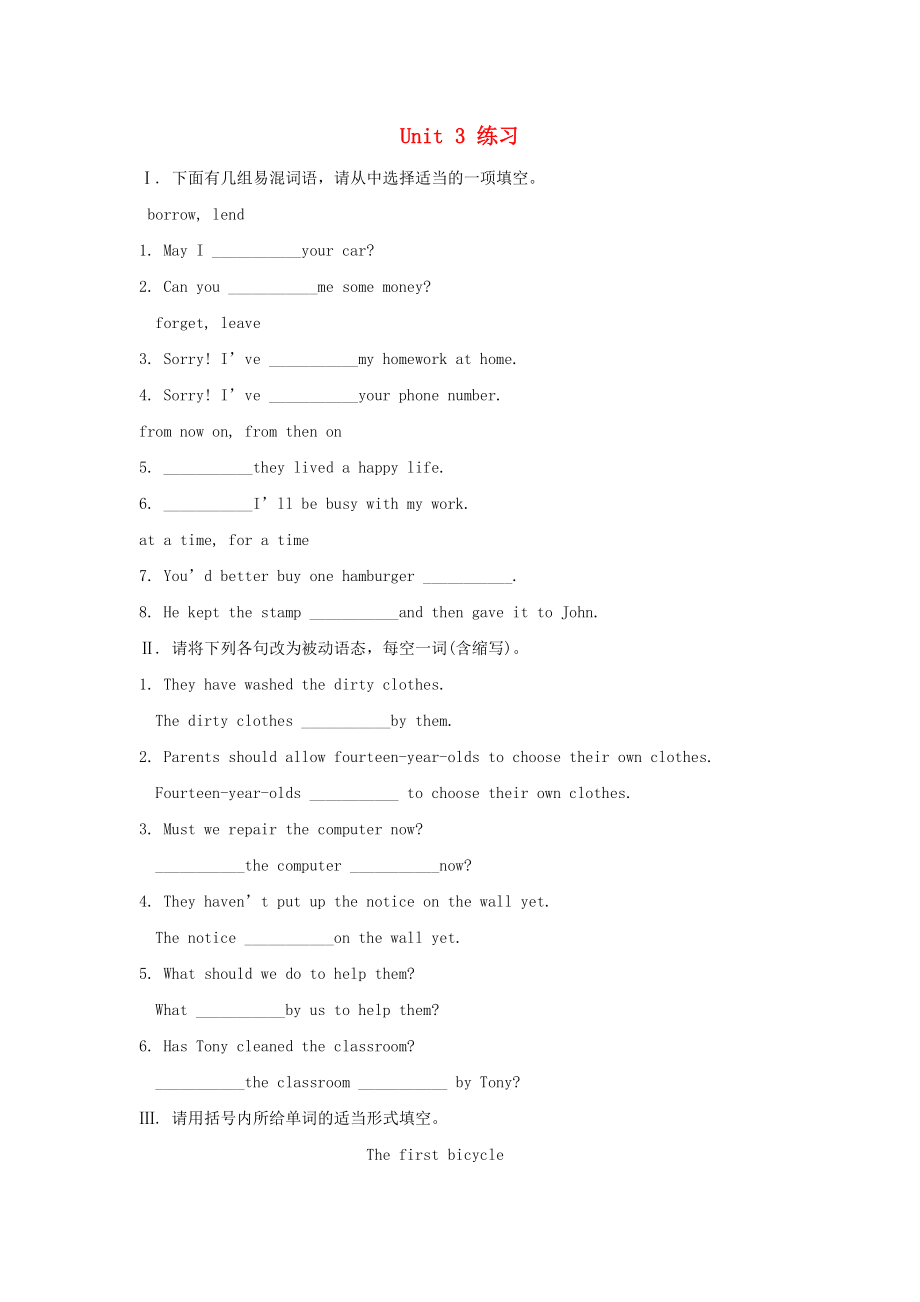《2013年九年級(jí)英語上冊(cè) Module 4 Great Inventions Unit 3 Language in use練習(xí) 外研版》由會(huì)員分享�,可在線閱讀����,更多相關(guān)《2013年九年級(jí)英語上冊(cè) Module 4 Great Inventions Unit 3 Language in use練習(xí) 外研版(2頁珍藏版)》請(qǐng)?jiān)谘b配圖網(wǎng)上搜索��。
1����、Unit 3 練習(xí)
Ⅰ. 下面有幾組易混詞語,請(qǐng)從中選擇適當(dāng)?shù)囊豁?xiàng)填空�。
borrow, lend
1. May I ___________your car?
2. Can you ___________me some money?
forget, leave
3. Sorry! I’ve ___________my homework at home.
4. Sorry! I’ve ___________your phone number.
from now on, from then on
5. ___________they lived a happy life.
2、
6. ___________I’ll be busy with my work.
at a time, for a time
7. You’d better buy one hamburger ___________.
8. He kept the stamp ___________and then gave it to John.
Ⅱ. 請(qǐng)將下列各句改為被動(dòng)語態(tài)����,每空一詞(含縮寫)。
1. They have washed the dirty clothes.
The dirty clothes ___________by them.
2. Parents should
3���、allow fourteen-year-olds to choose their own clothes.
Fourteen-year-olds ___________ to choose their own clothes.
3. Must we repair the computer now?
___________the computer ___________now?
4. They haven’t put up the notice on the wall yet.
The notice ___________on the wall yet.
5. What should
4����、 we do to help them?
What ___________by us to help them?
6. Has Tony cleaned the classroom?
___________the classroom ___________ by Tony?
Ⅲ. 請(qǐng)用括號(hào)內(nèi)所給單詞的適當(dāng)形式填空����。
The first bicycle
Bicycles (1)__________(share) a common advantage with the automobile over public
modes of transport. The first bicyc
5��、le was not like the bicycle we see today. The first bicycle (2) __________ (invent) by Baron von Drais in the 1810s. It was a (3) __________ (walk) machine made of wood. It had no pedals (踏板). People (4) __________ (push) their feet against the ground to move forward. It helped people get around par
6、ks and gardens. Now bicycles (5)__________ (be) widely (6) __________ (use) by people all over the world.
Ⅳ. 請(qǐng)根據(jù)以下提示寫一個(gè)至少五句話的小段落��,注意用到被動(dòng)語態(tài)句子����。
世界上第一部手機(jī)于1973年由馬丁·庫珀(Martin Cooper)發(fā)明。現(xiàn)在���,手機(jī)在世界上被廣泛使用���,并且可以隨身攜帶。中國(guó)已經(jīng)有5億多人使用手機(jī)�����。我們相信��,越來越多的手機(jī)將會(huì)在未來投入使用��。
________________________________________________________
7���、________________________________________________________________________________________________________________________________________________________________________________________________________________________________________________________________________________________________
參考答案
8��、:
Ⅰ. 1. borrow 2. lend 3. left 4. forgotten 5. From then on
6. From now on 7. at a time 8. for a time
Ⅱ. 1. have been washed 2. should be allowed 3. Must; be repaired 4. hasn’t been put up 5. should be done 6. Has; been cleaned
Ⅲ. 1. share 2. was inv
9����、ented 3. walking 4. pushed
5. have been / are 6. used
Ⅳ. One possible version:
The first mobile phone in the world was invented by Martin Cooper in 1973. Now mobile phones are widely used in the world. They can
be carried everywhere easily. In China, they are used by more than 500 million people. We believe that more and more mobile phones will be used in the future.
 2013年九年級(jí)英語上冊(cè) Module 4 Great Inventions Unit 3 Language in use練習(xí) 外研版
2013年九年級(jí)英語上冊(cè) Module 4 Great Inventions Unit 3 Language in use練習(xí) 外研版

